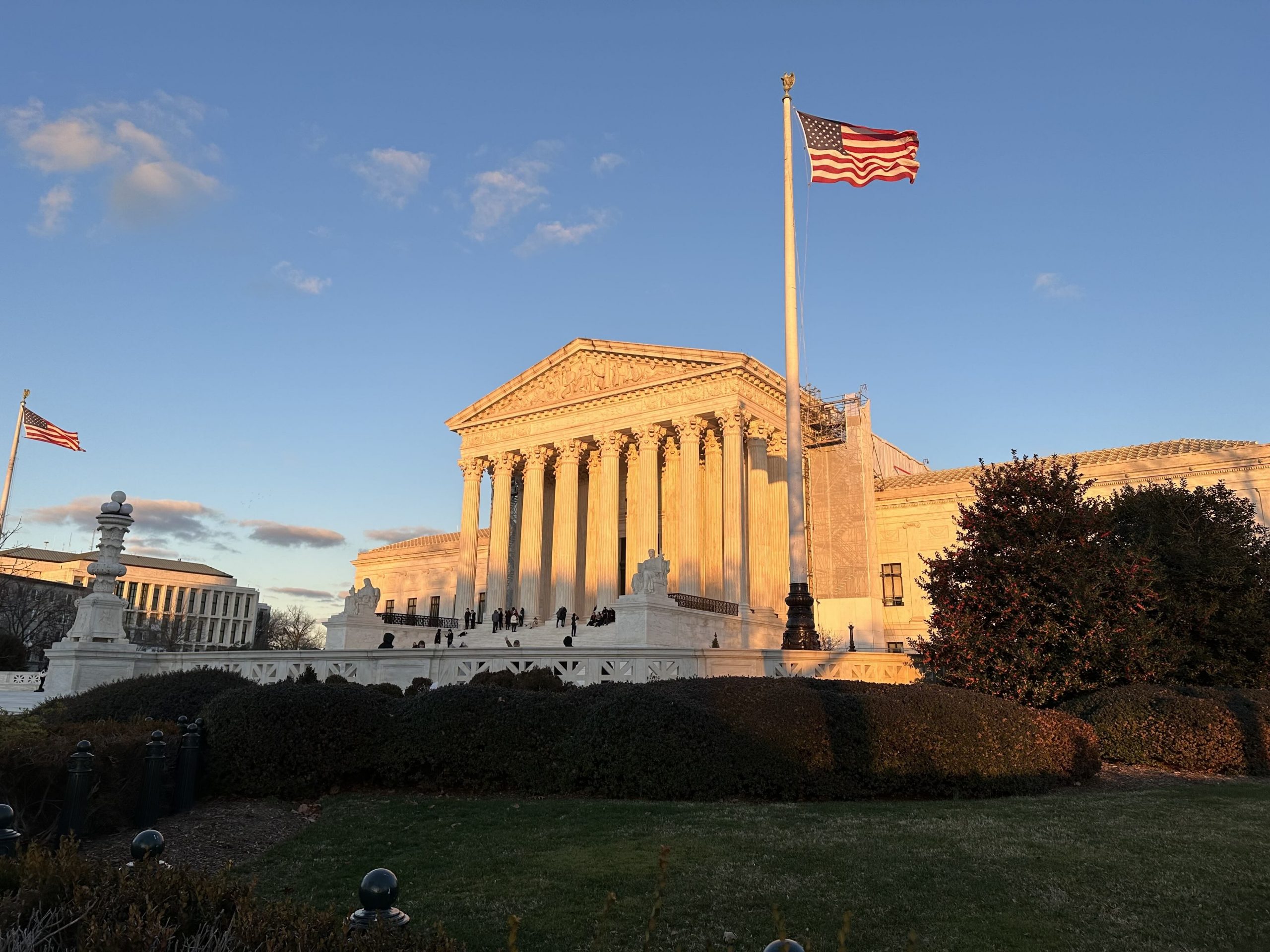Court agrees to hear Title VII employer discrimination case
SCOTUS NEWS
on Jun 30, 2023
at 6:28 pm
The Supreme Court agreed to decide what protections Title VII of the Civil Rights Act of 1964 provides to employees who contend they were the victim of a discriminatory transfer. The justices announced on Friday that they had granted review in Muldrow v. St. Louis and six other cases, two of which will be argued together. (I covered one of those cases, United States v. Rahimi, in a separate article.)
The question comes to the court in the case of Jatonya Muldrow, a sergeant with the St. Louis Police Department. She filed a lawsuit against the department, alleging that she was the victim of sex discrimination because she was involuntarily transferred from her position in the Intelligence Division to a patrol position because her supervisor wanted to hire a man for her job. The U.S. Court of Appeals for the 8th Circuit ruled for the police department, reasoning that Muldrow’s transfer had not resulted in a significant employment disadvantage for her.
Muldrow went to the Supreme Court, asking the justices to take up her case. After considering the cases at a conference in early January, the justices sought the Biden administration’s views. In a brief filed last month, the Biden administration urged the justices to grant review. U.S. Solicitor General Prelogar told the court that the rulings by the U.S. Court of Appeals for the 8th Circuit had “no foundation in Title VII’s text, structure, or purpose.”
After considering the case again at two conferences in June, the justices agreed to take up the case. But they instructed Muldrow and the city of St. Louis to brief a slightly narrower question than Muldrow had asked them to decide – whether Title VII bars discrimination in transfer decisions if a court has not determined separately that the transfer decision caused a significant disadvantage.
The other cases (in addition to Rahimi) in which the court granted review are:
- Wilkinson v. Garland, in which the justices will consider whether federal courts have the power to review an agency’s determination that a noncitizen did not meet the “exceptional and extremely unusual” hardship requirement to cancel deportation;
- Campos-Chaves v. Garland and Garland v. Singh (consolidated for one hour of oral argument), in which the justices will consider notice requirements in immigration cases;
- McElrath v. Georgia, in which the justices will consider double jeopardy issues in the case of a Georgia man who was found not guilty by reason of insanity on one charge arising from the stabbing death of his mother, while he was found guilty but mentally ill on another charge. The Georgia Supreme Court threw out both of the jury’s verdicts and sent the case back for a new trial on both charges. McElrath argues that the Constitution’s ban on double jeopardy bars the state from trying him again on the charge on which he had been acquitted.
- SEC v. Jarkasy, in which the justices will review a ruling by the U.S. Court of Appeals for the 5th Circuit finding constitutional defects in the agency’s enforcement proceedings.
Several denials of review garnered separate writings by one or more justices.
In McClinton v. United States, the justices declined to decide whether the Constitution bars federal courts from basing a criminal defendant’s sentence on conduct for which he was acquitted. The question came to the court in the case of Dayonta McClinton, who was convicted for his role in the armed robbery of a CVS pharmacy. Although the jury found that McClinton was not guilty of the shooting death of one of his accomplices, Malik Perry, during a dispute over dividing up the drugs that they stole, the judge nonetheless relied on Perry’s death to increase McClinton’s sentence for the robbery charges. McClinton was sentenced to 19 years in prison – a sentence three times longer than he would have otherwise received. Justice Sonia Sotomayor wrote a statement in which she indicated that the denial of review in McClinton’s case and others presenting similar issues “should not be misinterpreted.” She explained that the U.S. Sentencing Commission will consider questions relating to acquitted-conduct sentencing next year. But if it “does not act expeditiously or chooses not to act,” she wrote, the court may need to step in.
Justice Brett Kavanaugh wrote a short statement that was joined by Justices Neil Gorsuch and Amy Coney Barrett. He echoed Sotomayor’s admonition that the denial of review “should not be misinterpreted.” But because the question is before the Sentencing Commission now, he stressed, the court should wait before granting review.
In a six-page opinion concurring in the denial of review, Justice Samuel Alito outlined some of the arguments against McClinton’s position. In particular, he noted, federal criminal laws in the late 18th century “often gave sentencing judges the authority to impose any sentence that fell within a prescribed range, and in exercising that authority, judges necessarily took into account facts that the jury had not found at trial.”
The court denied review in Roberts v. McDonald, a lawsuit seeking to bar New York and New York City from considering race or ethnicity in connection with the allocation of COVID-19 treatments. In a statement regarding the denial of review joined by Justice Clarence Thomas, Alito wrote that he agreed with that decision because there is no longer a shortage of such treatments. But if “any government again resorts to racial or ethnic classifications to ration medical treatment,” Alito said, “there would be a very strong case for prompt review by this Court.”
Alito, joined by Thomas, also penned a statement regarding the denial of review in Thompson v. Henderson, a case arising from a car accident in Washington state. The jury awarded the victim of the accident, who is Black, $9,200 in damages from the driver, who is white. The Washington Supreme Court awarded the victim a hearing on her motion for a new trial, concluding that the jury’s award may have been tainted by racial prejudice. Alito argued that the state supreme court’s “decision raises serious and trouble issues of due process and equal protection” and “threatens to inject racial considerations into every litigation decision parties make.”
Justice Ketanji Brown Jackson, joined by Sotomayor, dissented from the denial of review in Harness v. Watson, a challenge by two Mississippi men to the enforcement of a provision of the state’s constitution, adopted in 1890, that prohibits people convicted of eight crimes – bribery, theft, arson, fraud, perjury, forgery, embezzlement, and bigamy – from voting. In 1985, the challengers note, the Supreme Court struck down a similar provision in the Alabama constitution that had been enacted to disenfranchise African Americans. The same is true here, the challengers contend: “Just as in Alabama, in Mississippi the offenses set forth in the 1890 Constitution were those that the drafters believed were disproportionately committed by African Americans.”
The U.S. Court of Appeals for the 5th Circuit upheld the 1890 provision. Although the majority conceded that the 1890 state constitutional convention was “steeped in racism” and that the 1890 provision, as originally enacted, would be unconstitutional. But since 1890, the majority explained, Mississippi voters had re-enacted the disenfranchisement provision twice – in 1950 and 1968 – and the challengers do not contend that the 1968 amendment was motivated by an intent to discriminate. In so doing, the majority reasoned, the discriminatory intent behind the 1890 provision became “irrelevant” and “purg[ed] the original taint.”
The challengers came to the Supreme Court last fall, asking the justices to weigh in. After repeatedly rescheduling the case and then considering it at seven separate conferences, the justices on Friday denied review.
Jackson argued that the Supreme Court could have corrected what she characterized as the 5th Circuit’s “clear and constitutionally momentous errors” in a “straightforward and narrow (but significant) manner.” Quoting from the court’s decision on Thursday ending the use of race-conscious admissions at Harvard and the University of North Carolina, in which the court “declared that the Constitution deals with substance, not shadows, and the constitutional prohibition against racial discrimination is levelled at the thing, not the name,” Jackson contended that there “are no shadows in” the Mississippi provision, “only the most toxic of substances.”
Jackson also indicated that she would have granted review in Lombardo v. St. Louis, in a case brought by the family of a homeless man who died in 2015 in police custody. Nicholas Gilbert was arrested on charges that included trespassing and failing to appear in court for a traffic violation. For 15 minutes, six police officers applied pressure to Gilbert, who was face down on the floor of his cell with his legs shackled and his hands cuffed behind us back. Gilbert tried to lift his body up to breathe and pleaded with the officers to stop, saying “It hurts.” He was pronounced dead at a nearby hospital.
Gilbert’s family sued the city and the police officers, arguing (among other things) that the officers had used excessive force against Gilbert, which violated his constitutional rights. The 8th Circuit dismissed their claims, holding that the officers could not be held liable because no reasonable jury could find that the officers had used excessive force.
Over a dissent by Alito that was joined by Thomas and Gorsuch, the justices sent the case back to the 8th Circuit for another look. In a brief opinion, the Supreme Court explained that because the court of appeals had apparently either “failed to analyze such evidence or characterized it as ‘insignificant,’” it had not conducted the kind of “careful, context-specific analysis required by this Court’s excessive force precedent.”
When the case returned to the 8th Circuit, the court of appeals once again concluded that the officers were entitled to immunity. Gilbert’s family, the court of appeals concluded, had not met one of the criteria to overcome the police officers’ immunity – specifically, it had not shown that Gilbert had a clearly established right not to be restrained while lying prone on the floor and resisting.
The family returned to the Supreme Court late last year, once again asking the justices to review the 8th Circuit’s ruling. The justices denied review on Friday, over a dissent from Sotomayor. She wrote that she would have sent the case back to the 8th Circuit again for the court of appeals to “resolve the question of qualified immunity without assuming that Gilbert’s final movements were those of a dangerously non-compliant person posing a threat, rather than of a dying man struggling to breathe while adequately restrained by handcuffs and leg shackles and surrounded by six officers in a secure cell.” She added that courts should “give officers leeway to use judgment in close situations, but not so much leeway that we nullify the Constitution’s protections or permit officers to escape scrutiny by juries.”
Sotomayor dissented from the denial of review in another case involving immunity for police officers: a case brought by the family of Ryan Stokes, an unarmed Black man who was surrendering to police when a police officer shot him in the back and killed him. The 8th Circuit held in Stokes’ case that it was not clearly established that the officer had used excessive force. Sotomayor indicated that she would have summarily reversed – that is, ruled in the family’s favor without additional briefing or oral argument. “It is time,” she wrote, “to restore some reason to a doctrine that is becoming increasingly unreasonable. If this Court is unwilling to do so,” she concluded, “then it should reexamine its judge-made doctrine of qualified immunity writ large.”
Alito, joined by Thomas, dissented from the denial of review in Kincaid v. Williams, in which they had been asked to decide whether the Americans with Disabilities Act covers gender dysphoria – that is, the psychological distress caused by a conflict between a person’s gender identity and the sex that person was assigned at birth.
The question arose in a federal civil rights case filed by Kesha Williams, a transgender woman who suffers from gender dysphoria. By the time Williams was incarcerated at the Fairfax County Adult Detention Center, in northern Virginia, in 2018, she had been receiving hormone therapy for 15 years.
Williams was originally assigned to the women’s side of the detention center, but she was later moved to the men’s side of the prison and required to wear men’s clothing. She contends that she did not consistently receive her hormone therapy, and she was harassed by both prison deputies and male inmates.
After her six months in the detention center ended, Williams went to federal court, where she contended that the Fairfax County sheriff and other prison officials had violated (among other things) the Americans with Disabilities Act. A federal district court in Virginia dismissed Williams’ case, agreeing with the defendants that gender dysphoria is not a “disability” under the ADA. But the U.S. Court of Appeals for the 4th Circuit reversed that ruling, prompting the sheriff to come to the Supreme Court in January.
After considering the case at four consecutive conferences, the justices denied review. In his dissent, Alito described the question before the court as one “of great national importance that calls out for prompt review.” The court of appeals, he contended, “has effectively invalidated a major provision of the Americans with Disabilities Act (ADA), and that decision is certain to have far-reaching and highly controversial effects.” Moreover, he added, the ruling is likely to “raise a host of important and sensitive questions regarding such matters as participation in women’s and girls’ sports, access to single-sex restrooms and housing, the use of traditional pronouns, and the administration of sex reassignment therapy.”
And in Clark v. Mississippi, Justice Elena Kagan and Jackson joined Sotomayor’s dissent from the denial of review in the case of Tony Clark, who was sentenced to death for the 2014 shooting death of 13-year-old Muhammad Saeed. Saeed was working with his father at the family’s convenience store when Clark and his nephew attempted to rob the store.
Clark came to the Supreme Court in November, asking the justices to overturn his conviction and death sentence. Clark, who is Black, emphasized that although the pool of 38 potential jurors included 8 Black people, prosecutors struck all but one of those potential Black jurors, leaving a nearly all-white jury. In rejecting his challenge to the constitutionality of the jury selection process, Clark argued, the Mississippi Supreme Court should have reviewed the prosecutors’ strikes, and the circumstances in which they were made, collectively, rather than looking at each one in isolation.
Sotomayor noted that four years ago, the Supreme Court threw out the conviction of a Mississippi man, Curtis Flowers. Flowers, who is Black, was sentenced to death by a jury that included just one Black member after prosecutors struck five other potential Black jurors from the jury pool. By a vote of 7-2, the court held that the jury selection in Flowers’ case violated the Constitution. By denying review in Clark’s case, Sotomayor asserted, “this Court tells the Mississippi Supreme Court that it has called our bluff, and that this Court is unwilling to do what is necessary to defend its own precedent. The result is that Flowers will be toothless in the very State where it appears to be still so needed.”
This article was originally published at Howe on the Court.






